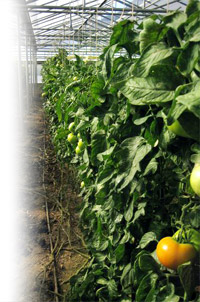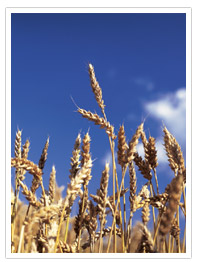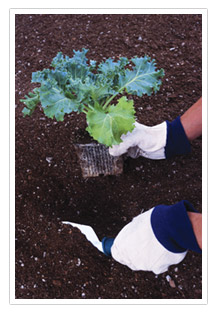|
Organic
Farming
Organic Farming By Australian News Group (Originally in English)
The Benefits of Organic Farming Organic farming is a holistic way of growing food with an emphasis on sustainability, environmental protection, and the conservation of our precious soil and water resources. No synthetic, petroleum-based fertilizers or pesticides are used, no crops are genetically modified, and the use of biological and non-synthetic pesticides is highly regulated, thus protecting our land, water, air, food and wildlife from the harmful agents so commonly used in conventional farming. Through a variety of techniques such as crop rotation, green manures, and biological pest control, organic farmers are able to build healthy soil and produce healthy plants better able to resist disease and insect predation. These plants, grown in nutrient-rich soil, contain higher levels of minerals and micronutrients, including important vitamins and antioxidants. Thus, in addition to being free of harmful toxins, they are far better foods for our vitality and health. It is no wonder, then, that more and more doctors are recommending organic, plant-based diets for our improved health and recovery from chronic disease. Organic farming also offers the following benefits: Protects millions of farmers and agricultural workers worldwide from pesticide poisoning and related fatalities; reduces individuals’ risk of pesticide-related cancer, decreased fertility and adverse effects on the nervous system; safeguards the health of our more vulnerable children and unborn babies; enhances biodiversity; preserves the important topsoil necessary for plant cultivation from rapid depletion caused by conventional farming; minimizes dead zones that form in our oceans due to synthetic fertilizers; protects bee colonies from collapse, in turn securing our food supplies; and much more... Combating Global Warming and Creating a Healthy, Sustainable Future Organic farming offers us tremendous hope with its capacity to help tackle some of the most critical environmental issues of the day: global warming, environmental degradation, and increased food and water shortages worldwide. Compared to conventional farming, it uses significantly less fossil energy and water to produce the same crop yields. Furthermore, it may help to mitigate and even reverse the effects of climate change. In one of the longest studies ever conducted on organic farming, the US-based Rodale Institute found that organic soil management not only minimizes fossil fuel use, but also removes carbon dioxide from the air and stores it as carbon in the soil. Scientists at Rodale estimate that if organic practices were implemented on the planet’s 3.5 billion tillable acres, nearly 40 percent of current CO2 emissions could be absorbed. With CO2 taking 100 years to leave the atmosphere, the latest research suggesting our planet is in imminent danger, with global warming fast approaching a point of no return, and our precious carbon sinks such as the oceans and forests being rapidly destroyed, the tremendous implications of this for saving our planet cannot be emphasized enough. Indeed, Dr. Timothy J. LaSalle, CEO of The Rodale Institute, states that agriculture “…could be one of the most powerful strategies in the fight against global warming.” A Safe and Compassionate World for All For further information:
|
||||||
 As
people across the globe turn more and more to eco-friendly lifestyles,
organic foods and products are gaining in popularity for their benefits
to our health and the planet. This wonderful trend holds great promise
for a brighter future, as organic farming is not only more in harmony
with the natural environment, but could be a major key to our survival
as a sustainable and healthy planet. Why? It can help reduce global
warming, and more!
As
people across the globe turn more and more to eco-friendly lifestyles,
organic foods and products are gaining in popularity for their benefits
to our health and the planet. This wonderful trend holds great promise
for a brighter future, as organic farming is not only more in harmony
with the natural environment, but could be a major key to our survival
as a sustainable and healthy planet. Why? It can help reduce global
warming, and more!
 In
addition, numerous studies have shown organic farms can better
withstand severe weather conditions and flooding, with yields far
higher than conventional farms during times of both drought and
flood. A study of over 1,800 organic and sustainable farms in
Central America hit by Hurricane Mitch in 1998 found that these
farms suffered significantly less damage and less topsoil loss than
their neighboring conventional farms. A recent study by the United
Nations contends that organic agriculture in Africa “offers not only
improved food security, but also an array of other economic,
environmental, health and social benefits,” with findings that
“yields had more than doubled where organic, or near-organic
practices had been used” in an assessment of 114 projects spanning
24 African countries.
In
addition, numerous studies have shown organic farms can better
withstand severe weather conditions and flooding, with yields far
higher than conventional farms during times of both drought and
flood. A study of over 1,800 organic and sustainable farms in
Central America hit by Hurricane Mitch in 1998 found that these
farms suffered significantly less damage and less topsoil loss than
their neighboring conventional farms. A recent study by the United
Nations contends that organic agriculture in Africa “offers not only
improved food security, but also an array of other economic,
environmental, health and social benefits,” with findings that
“yields had more than doubled where organic, or near-organic
practices had been used” in an assessment of 114 projects spanning
24 African countries.
 Respect
for all life is one of the wonderful principles of organic farming.
As we protect the lives around us, we ourselves are safeguarded. In
turn, protecting the lives and wellbeing of animals through the adoption
of a plant-based, animal-free diet is the single most powerful step
we can take to safeguard our precious planet from peril, producing
87% less greenhouse emissions than a meat-based diet. An organic,
plant-based diet takes this one step further, producing 94% less greenhouse
emissions! Thus, the tools for our survival are at hand. Knowing the
tremendous positive impact we can make with every meal we eat and
every product we use, we are more empowered than ever to bring about
a brighter future for all. Buying organic as much as our budget allows
will increase more support for organic farming, and as demand increases
and governments switch to subsidizing sustainable plant-based farming
instead of the livestock industry, prices of organic food will fall,
making it affordable for all to enjoy. In fact, some foods, such as
bean and alfalfa sprouts, are inexpensive, and can be easily grown
at home. Whether we are traditional farmers out in the fields, at-home
gardeners, or regular consumers, one thing is clear: using chemical-free
and animal-free foods and products will create a safe, healthy and
compassionate world for all.
Respect
for all life is one of the wonderful principles of organic farming.
As we protect the lives around us, we ourselves are safeguarded. In
turn, protecting the lives and wellbeing of animals through the adoption
of a plant-based, animal-free diet is the single most powerful step
we can take to safeguard our precious planet from peril, producing
87% less greenhouse emissions than a meat-based diet. An organic,
plant-based diet takes this one step further, producing 94% less greenhouse
emissions! Thus, the tools for our survival are at hand. Knowing the
tremendous positive impact we can make with every meal we eat and
every product we use, we are more empowered than ever to bring about
a brighter future for all. Buying organic as much as our budget allows
will increase more support for organic farming, and as demand increases
and governments switch to subsidizing sustainable plant-based farming
instead of the livestock industry, prices of organic food will fall,
making it affordable for all to enjoy. In fact, some foods, such as
bean and alfalfa sprouts, are inexpensive, and can be easily grown
at home. Whether we are traditional farmers out in the fields, at-home
gardeners, or regular consumers, one thing is clear: using chemical-free
and animal-free foods and products will create a safe, healthy and
compassionate world for all.